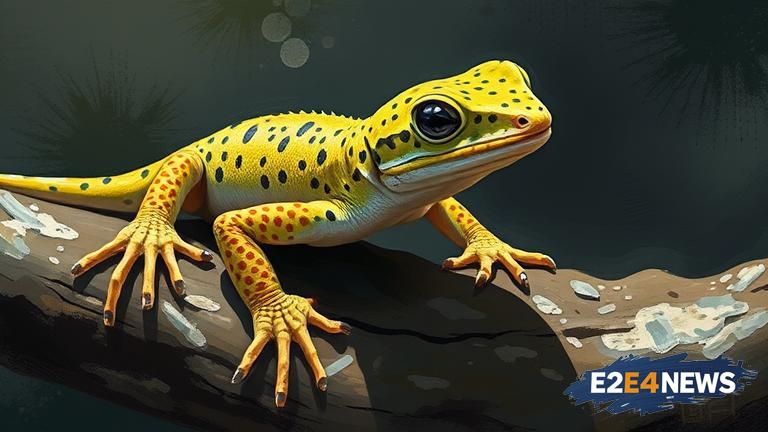The Galapagos gecko, a species that was once thought to be extinct, has been rediscovered in the Galapagos Islands. This remarkable discovery has sent shockwaves throughout the scientific community, and has sparked hope for conservation efforts. The Galapagos gecko, which is a small, nocturnal lizard, was last seen in the 1980s, and was subsequently declared extinct. However, a team of researchers from the Galapagos National Park, in collaboration with the Charles Darwin Research Station, has confirmed the presence of the species on the island of Isabela. The team used a combination of field observations, camera traps, and genetic analysis to confirm the identity of the species. The rediscovery of the Galapagos gecko is a significant find, as it highlights the importance of continued conservation efforts in the Galapagos Islands. The Galapagos Islands are a unique and fragile ecosystem, and the loss of any species can have a significant impact on the delicate balance of the environment. The Galapagos gecko is a key component of the ecosystem, and its rediscovery provides a unique opportunity for scientists to study the species and learn more about its behavior, habitat, and population dynamics. The conservation of the Galapagos gecko will require a multi-faceted approach, including habitat protection, research, and education. The Galapagos National Park has already begun to take steps to protect the species, including the establishment of a protected area and the implementation of measures to control invasive species. The rediscovery of the Galapagos gecko is also a testament to the power of collaboration and international cooperation. The team of researchers that made the discovery was comprised of scientists from around the world, and the project was supported by a range of organizations, including the Galapagos National Park, the Charles Darwin Research Station, and the International Union for Conservation of Nature. The discovery of the Galapagos gecko has also sparked interest and excitement among the general public, and has highlighted the importance of conservation efforts. The Galapagos Islands are a popular tourist destination, and the rediscovery of the Galapagos gecko provides a unique opportunity for visitors to learn about the species and the conservation efforts that are in place to protect it. The Galapagos gecko is a small, but significant, species that plays a vital role in the ecosystem of the Galapagos Islands. The species is found only in the Galapagos Islands, and is adapted to the unique conditions of the islands. The Galapagos gecko is a nocturnal species, and is found in a range of habitats, including forests, grasslands, and rocky outcrops. The species is also known to be an important food source for a range of predators, including birds, snakes, and other lizards. The conservation of the Galapagos gecko will require a long-term commitment to protecting the species and its habitat. The Galapagos National Park has already begun to take steps to protect the species, including the establishment of a protected area and the implementation of measures to control invasive species. The rediscovery of the Galapagos gecko is a significant find, and provides a unique opportunity for scientists to study the species and learn more about its behavior, habitat, and population dynamics. The discovery of the Galapagos gecko has also sparked interest and excitement among the general public, and has highlighted the importance of conservation efforts. The Galapagos Islands are a unique and fragile ecosystem, and the loss of any species can have a significant impact on the delicate balance of the environment. The Galapagos gecko is a key component of the ecosystem, and its rediscovery provides a unique opportunity for scientists to study the species and learn more about its behavior, habitat, and population dynamics. The conservation of the Galapagos gecko will require a multi-faceted approach, including habitat protection, research, and education. The Galapagos National Park has already begun to take steps to protect the species, including the establishment of a protected area and the implementation of measures to control invasive species. The rediscovery of the Galapagos gecko is a testament to the power of collaboration and international cooperation, and highlights the importance of continued conservation efforts in the Galapagos Islands.
